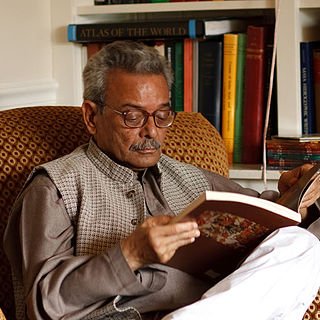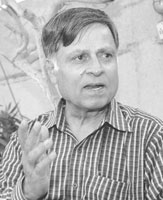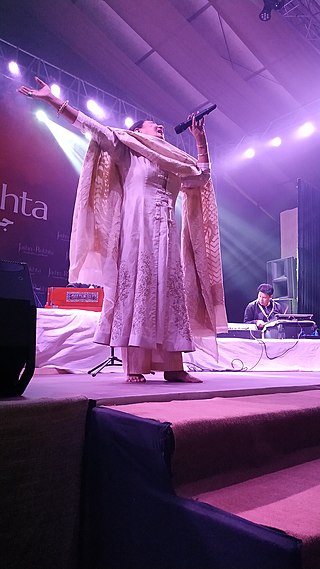Related Research Articles

Mir Babar Ali Anees, also known as Mir Anees was an Indian Urdu poet. He used his pen-name (takhallus) of Anees in poetry. Anees used Persian, Urdu, Arabic, and Sanskrit words in his poetry. Anis wrote prolonged Marsias, which was a custom of his times, but nowadays only selected sections are narrated even in religious ceremonies. He died in 1291 Hijra, corresponding with 1874 CE.

Urdu literature comprises the literary works, written in the Urdu language. While, It tends to be dominated by poetry, especially the verse forms of the ghazal and nazm, it has expanded into other styles of writing, including that of the short story, or afsana. Urdu literature is popular mostly in Pakistan, where Urdu is the national language, and in India, where it is an Eighth Schedule language.

Shamsur Rahman was a Bangladeshi poet, columnist and journalist. A prolific writer, Rahman produced more than sixty books of poetry collection and is considered a key figure in Bengali literature from the latter half of the 20th century. He was regarded as the unofficial poet laureate of Bangladesh. Major themes in his poetry and writings include liberal humanism, human relations, romanticised rebellion of youth, the emergence of and consequent events in Bangladesh, and opposition to religious fundamentalism.
Ibn-e-Safi was the pen name of Asrar Ahmad, a fiction writer, novelist and poet of Urdu from Pakistan. The word Ibn-e-Safi is a Persian expression which literally means Son of Safi, where the word Safi means chaste or righteous. He first wrote from the British India of the 1940s, and later Pakistan after the independence of British India in 1947.

Syed Waheed Akhtar was an Urdu poet, writer, critic, orator, and a Muslim scholar and philosopher.

Shamsur Rahman Faruqi was an Indian Urdu language poet, author, critic, and theorist. He is known for ushering modernism to Urdu literature. He formulated fresh models of literary appreciation that combined Western principles of literary criticism and subsequently applied them to Urdu literature after adapting them to address literary aesthetics native to Arabic, Persian, and Urdu. Some of his notable works included Sher-e-Shor Angez (1996), Ka’i Chand The Sar-e Asman (2006), The Mirror of Beauty (2013), and The Sun that Rose from the Earth (2014). He was also the editor and publisher of the Urdu literary magazine Shabkhoon.

Ahfaz-ur-Rahman, was a Pakistani journalist, writer and poet. He struggled for the freedom of the press and for the rights of journalists under military dictatorships and even civilian governments.
Muhammad Husain Azad was a scholar and an Urdu writer who wrote both prose and poetry, but he is mostly remembered for his prose. His best known work is Aab-e-Hayat.

Arvind Krishna Mehrotra is an Indian poet, anthologist, literary critic and translator.
Ahmad Siddiq, better known by his pen name Majnun Gorakhpuri, was an Urdu short story (Afsana) writer, poet and literary critic.
Khaleel-Ur-Rehman Azmi, also known as Khalil al-Rehman Azmi, was an Urdu poet and literary critic who was born in the village Seedhan Sultanpur in the district of Azamgarh.
Mayank Austen Soofi is a Delhi-based Indian writer, blogger and photojournalist, who writes popular columns for Hindustan Times and Mint on culture, food and literary landscapes of Delhi.
S.M. Yunus Jaffery was an Indian scholar of the Persian language. He was from Delhi, India.

Jashn-e-Rekhta is the world's largest Urdu language literary festival. It is a three-day event held in New Delhi that celebrates Urdu language. This event is flagship event of Rekhta Foundation. The festival showcases Urdu poetry, Urdu literature, Qawwali, Islamic calligraphy, with performances such as Ghazal, Sufi music, recitations, panel discussions, debates, conversations on films, and calligraphy workshops. It also includes shopping and food festival. It provides a platform for Urdu lovers to share their poetry and stories in various open forums. The slogan of the festival is "Celebrating Urdu", and it is attended by a huge number of Urdu enthusiasts, especially people who are younger.

The Urdu ghazal is a literary form of the ghazal-poetry unique to the Indian subcontinent, written in the Urdu standard of the Hindostani language. It is commonly asserted that the ghazal spread to South Asia from the influence of Sufi mystics in the Delhi Sultanate.

Shama was a monthly Indian Urdu-language film and literary magazine published from 1939 to 1999. Considered the world's biggest chain of Urdu-language magazines at the time, the Shama group published several other famous magazines and digests including Sushama (Hindi), Khilauna, Dost aur Dosti, Bano, Sushmita, Mujrim, Doshi, A'inah, Shabistan and Rasia Kashidakari. The magazine was a household name and has been described as a "movement of Urdu which gave birth to a new tradition".
Abul Kalam Qasmi was an Indian scholar, literary critic, and a poet of the Urdu language who served as the dean of the Faculty of Arts at the Aligarh Muslim University. He was the editor of Tehzeeb-ul-Akhlaq and authored books such as The Criticism of Poetry. He translated E. M. Forster's Aspects of the Novel into Urdu as Novel ka Fun. He was conferred with the Sahitya Akademi Award in 2009, and the Ghalib Award in 2013.
Karamat Ali Karamat (1936–2022) was an Indian Urdu poet, author, literary critic, and mathematician. Karamat is known for collecting and introducing Odisha's Urdu literature to the Urdu-speaking world. His works include Aab e Khizar (1963), Shu'aon Ki Salīb (1972), Izāfi Tanqīd (1977), Lafzon Kā Aasmān (1984), and Lafzon Kā Ākāsh (2000). Karamat received the 2004 Sahitya Akademi Translation Prize for his Urdu translation, Lafzon Kā Ākāsh.
References
- 1 2 Ahmad, Abrar. "Shab Khoon expires at forty". Urdu Club. Archived from the original on 5 March 2016. Retrieved 10 May 2015.
- ↑ Pue, A. Sean (1 December 2011). "In the mirror of Ghalib: Post-colonial reflections on Indo-Muslim selfhood". The Indian Economic & Social History Review. 48 (4): 571–592. doi:10.1177/001946461104800404. ISSN 0019-4646. S2CID 145793682.
- 1 2 3 4 Farooqi, Mehr Afshan (1 February 2021). "Remembering my father, Shamsur Rahman Faruqi". The Caravan. Archived from the original on 1 February 2021. Retrieved 1 February 2021.
- ↑ Soofi, Mayank Austen (15 November 2014). "Shamsur Rahman Faruqi: Darcy was a 'damn sexist'". mint. Archived from the original on 27 January 2021. Retrieved 2 February 2021.
- ↑ Kumar, Nikhil (1 April 2019). "Shamsur Rahman Faruqi: The literary life of a translator". The Caravan. Retrieved 5 February 2021.